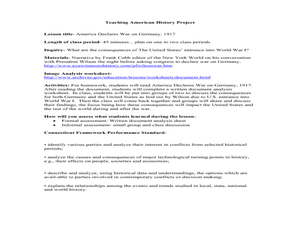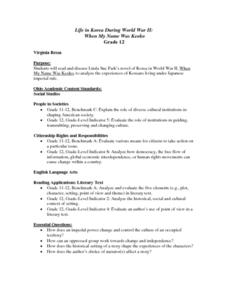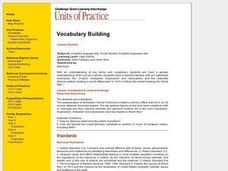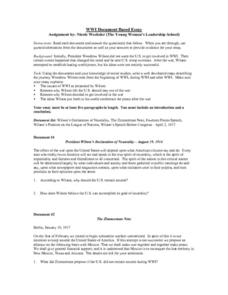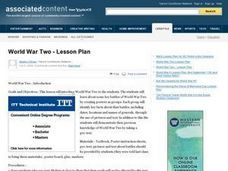Curated OER
World War II: "The Other" Americans
Eleventh graders examine the roles of women and minorities during Word War II. In this American History lesson, 11th graders watch the video "Saving Private Ryan". Students read a book on the topic and answer comprehension...
University of California
Decolonization
The ripple effect from one small event can impact many others. Young historians research the ripple effect World War II had on decolonization in the second installment of an eight-part series. Through primary and secondary documents as...
Curated OER
Cold War Roots and Events
Ninth graders examine the causes and major events of the Cold War. They listen to a lecture and fill in the blanks on a handout, and in two groups develop a proposal to deal with the Cuban Missile Crisis.
Curated OER
Perceptions of War
Tenth graders share perspectives on war with Iraq with students from various countries, and write position papers expressing specific stance on issues.
Curated OER
Images at War
Learners examine American attitudes toward war as revealed in Civil War photographs and WWII homefront posters. They analyze and discuss photos, explore the National Archives website, and organize a statement of their findings.
Curated OER
The Cause and Course of the Great War
Students interpret historical evidence presented in primary and secondary resources. In this World War I lesson plan, students research the causes of the war as well as the major events of the war. Students are...
Curated OER
What Did You Do After the War, Grandpa?
Students consider how World War II impacted Europe and European soldiers. In this Victory in Europe lesson, students visit selected websites to discover information about the war, its conditions, and the celebration that ensued...
Curated OER
Post-War Suburbanization: Causes and Interpretations
In this teaching American history worksheet, students examine a primary source document regarding post-World War II suburbanization. Students discuss their impressions of the document.
Curated OER
America Declares War on Germany, 1917
Young scholars explore the reasons that the United States entered World War I. In this World War I lesson, students read "America Declares War on Germany, 1917," and then discuss the consequences for the U.S. entering the war.
Curated OER
What is to Become of the World After the War?
Learners analyze primary sources regarding World War II. In this World War II lesson, students read "The Atlantic Charter," and respond to questions about the document.
Curated OER
America's Economy: Sorrow And Hope
Students discover how Americans found the hope that broke the Great Depression. In this American economics instructional activity, students watch "America's Economy: Sorrow and Hope." Students then discuss the implications of the...
Curated OER
Atomic Bomb Debate
Students research the decision to end World War II by dropping the atomic bomb. In this world history instructional activity, students explore information on the atomic bomb and the decision of the tactics to use it. They...
Curated OER
The Political Dr. Seuss
Young scholars discuss the role political cartoons have played in U.S. politics and public affairs since the 1700's. They analyze some of the political cartoons Dr. Seuss drew during World War II and discuss how these cartoons conveyed...
Curated OER
Why Empire? Why War?
Tenth graders examine the purpose of territorial expansion. For this World History lesson, 10th graders analyze various articles on World War II. Students prepare arguments for and against territorial expansion.
Curated OER
My Secret War: Lesson 14
Fifth graders explore the civilian role during World War II. In this social studies lesson, 5th graders write an "I Am an American" poem from the perspective of various Americans during the war.
Curated OER
Weapons of World War I
Ninth graders discover the weapons of World War I. They compare and contrast the weapons used during that time period with the weapons that are used in warfare today. They create a digital slide show with the history, uses, and...
Curated OER
Treaty of Versailles
Students describe the purposes of the Treaty of Versailles. In groups, they analyze the causes and effects of the treaty and discuss why the Americans were so against it. They note ideas for and against its ratification and they make...
Curated OER
An Untold Triumph
Middle schoolers examine and analyze the history and experience of Filipinos in Hawaii and California. They identify the contributions of Filipino Americans to the US war effort in World War II, and analyze the many causes that led to...
Curated OER
Life in Korea During World War II: When My Name Was Keoko
Twelfth graders review facts about roles of Asia and Japan in World War II, read When My Name Was Keoko to familiarize themselves with daily life and historic events during World War II in Korea, and participate in student-led...
Curated OER
Vocabulary Building - World War I
Students study the definitions of militarism, imperialism, and nationalism, and the significant individuals involved in the world alliance system prior to 1914. They examine the events that lead to World War I.
Curated OER
WWI Document Based Essay
Young scholars read various primary source documents on World War I. After reading each document, they answer discussion questions. Using the internet, they identify the causes of World War I as layed out by President Wilson and his...
Curated OER
American Reactions to Fascist Aggression
Students consider the causes of World War II. In this origins of World War II lesson, students discuss American reactions to fascist aggression prior to the war.
Curated OER
Lesson Plan on World War II: Illinois Role-The 33rd Infantry Division
Students complete several creative writing assignments regarding the 33rd Infantry Division of Illinois, which was active during World War II. They discuss how this war brought about changes in the state of Illinois and specifically,...
Curated OER
World War II
High schoolers create a Powerpoint presentation covering key information regarding a World War II battle and present the information to the class in the form of an oral presentation. They then will turn in a summary report including two...








